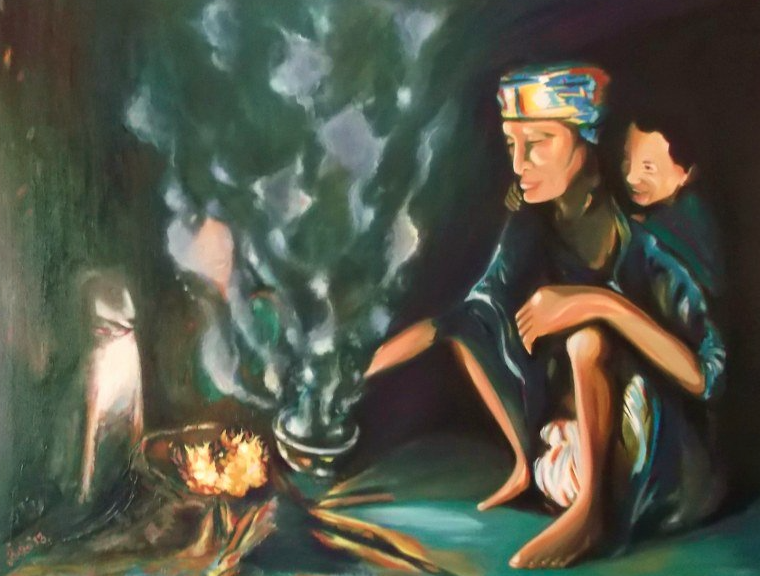
Ralph’s wife died suddenly last year. She was his soul-mate, his partner in work, and life held little meaning for him now. Community rituals were held to grieve her death, and more still to support the living. She left two children behind too, both from a different father and who were adopted by Ralph. He was now their sole ward, expected to be both mother and father, to carry on while the now empty heart of the home ruminated in a vacuum.
Now nine months after her death, Ralph, a guest in our home, found little else to talk about. During the hours when he would work, he might find inspiration to speak of things—things related to other people, to their lives, but once the day was done, the far away look in his eye returned, and his quiet, tired manner said I’m somewhere else right now, please leave me be.
For two nights, we would listen to him—the slow telling of how it happened, of how he told her to go to the hospital, but she wouldn’t listen. Little details, saved for a certain ripening, made their way out—the phone calls from her while in the hospital when he had to travel, his knowing to fly home after hearing her voice getting weaker, and yet something was still so poignant, so raw, that nothing he said seemed to lighten his burden. I thought to myself this must be how it is, it doesn’t end. Why would anyone still want to live?
Late into the night we sat, speaking by the fire, spontaneous sighs and “oh my god’s” ushering forth from our mouths when the fresh arrows of his burden would leap across the fire, searing us. I tried to imagine what this could be like. I had tried before, even grieving in advance for the day when my beloved and I would be separated in death.
It was late now, we all were thinking of turning in. The fire’s gradual extraction, had done its work on Ralph and all of us. What was sounding like it would be a denouement slowed the conversation down, with a pause followed by a stillness. And out of the stillness, emerged Ralph’s quiet and deafening statement. And she was two months pregnant.
Ralph had never had his own children. His wife had dreamed of having another child, of having a child with him, I thought.
I don’t think I’ve told anyone else about this, he shared.
I wondered how he had not, as in my mind, this burden would weigh equally as great as his wife’s death.
I couldn’t stop the sound from coming out of my mouth: Ughh, ohh, my hand involuntarily shooting up towards the fire’s sparks. The anguish, I thought. This pain is unspeakable.
I was glad Ralph told us. I had known the cost of holding secrets, whether they were for someone else or myself. This unborn child had to be made known.
We carried on to bed and through our next day. When night rolled around again, and it was time to sit down to dinner, something felt different. Ralph was smiling and joking about his day, we told light-hearted stories about our dogs, and about the places we’d seen in the world. When we moved out to the fire, something even felt celebratory—there was myrrh.
Later, before bed, I asked my beloved if he noticed that Ralph had not spoken even once of his dead wife. He said, no, he hadn’t noticed anything. But my hunch was that some of the unstuck lament that had Ralph tugged deeply into the underworld had also been the unnamed presence of his unborn child. I even suspect that the soul of that child, being real, incarnated, and embodied, insisted on recognition in this unravelling package of grief, that he or she too died, that he or she too will miss and be missed.
Where the labyrinth of grief for the unborn is more often paced by women, Ralph’s profound telling touched into a realm I have little experience with, that now I’m sure exists, that of a man’s tears for his unborn children.
Painting titled “Warmth” by Nunad Zuza. The caption: “They need so little for happiness. My family—my world.”

